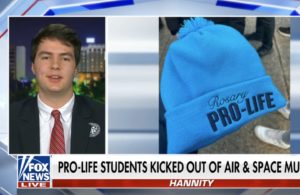‘We are the forefront of the pro-life generation’: What Gen Z pro-lifers are saying about abortion
While the media often reports how Generation Z is becoming increasingly pro-abortion, there remains a substantial, energetic base of pro-life youth eager to advocate for the rights of the…

While the media often reports how Generation Z is becoming increasingly pro-abortion, there remains a substantial, energetic base of pro-life youth eager to advocate for the rights of the preborn.
Thousands of them, and many others from all across the country, gathered for the 51st Annual March for Life on Jan. 19.
“We love life,” said Anna, a teenager at the march. “And not just because we’re religious. But our Declaration says every person has the right to life. We’re fighting for that.”
Another young woman, Celina, told The Lion she and her friend attended because they “love babies” and believe abortion should be illegal.
“I think that the woman’s right ends when the baby’s life begins, which is at conception. So, you have to think about the baby too, and not just the woman. It’s about both of them,” she said.
John Luka, a male college student, told The Lion he grew up Catholic and learned what it meant to be a part of a “culture of life” at a young age. He attended the march to bring more “hype” and “show the world the joy and love of God” in the fight for the preborn.
Asked for his thoughts on the common refrain that men should stay out of the abortion debate, John Luka expressed why he believes it’s important to get involved.
“I mean, not every baby that’s born is a woman, you know? And there are guys that are being affected by this too. And, honestly, a big part of the abortion issue is the selfishness of men and them pressuring women into getting abortions when they do things that are irresponsible. So, it’s up to us men to take more responsibility for this issue and not let it just fall to the other sex.”
This sentiment was also shared by Dominic Tolentino, a senior at Penn State and president of the Penn State Students for Life Club. Tolentino was invited as a guest speaker at the pre-march rally.
“My story is not one involving a direct connection to abortion. Instead, it involves a normal college student who has fears and worries knowing that I have different beliefs than most of the students on campus.
“It is knowing that people will call me insensitive, that due to my gender, I cannot have a say on this matter. It is knowing I may lose friends when they find out that I am unapologetically pro-life.”
Despite the anxiety of being unliked for his convictions, Tolentino’s belief in the sanctity of life motivates him to keep fighting.
“The discomfort of speaking up against the societal norm slowly gets chipped away because I remind myself that I fight for the life of the child to begin, to let the mother know that her life was just as precious and cared for as the unborn baby,” he told the crowd.
The fear of being rejected by their peers is not entirely unfounded for Gen Z pro-lifers. A 2023 Gallup poll revealed that 64% of young people ages 18-29 identify as pro-choice. Other surveys show even higher numbers of support.
However, the views of young people are more complex than a simple binary would suggest.
A 2022 survey from Vinea Research found that more than 4 in 10 Gen Z and Millennials are against abortion, though some favor exceptions for rape, incest, or to save the life of the mother. But 6 in 10 of the respondents said they were open to conservative or moderate opinions on the issue.
The fact that so many young people are still open to changing their minds is an encouragement for the pro-life movement. Many Gen Z activists are leading the charge in the effort to shift their peers’ opinions.
The Lion spoke with several of these young leaders during the March.
“I would say while you’re young, it’s such a great time to get involved in the pro-life movement,” said Melanie Salazar, Gen Z activist and Executive Director of Pro-Life San Francisco, a non-profit group dedicated to combatting “abortion extremism in the Bay Area.”
“I know it may be scary to risk your reputation and other things like that. But I want to encourage you that when you risk it all for the baby, you will be returned so much more [with] friendships that will last a lifetime, memories, and hopefully lives saved in the process.”
Also at the March was Stephanie Luiz, campaign manager for Terrisa Bukovinac’s 2024 presidential campaign. Bukovinac is running against Joe Biden for the Democratic presidential nomination.
“Terrisa’s campaign is a protest campaign,” Luiz explained. “We are running specifically to take advantage of the FCC rules surrounding campaign speech, which allows us to put any ad on television. We’re using it to really show people what abortion is and what it does and the impact it has, and how it is truly an injustice.”
One of Bukovinac’s campaign ads showed graphic images of aborted fetuses – several airing ahead of the New Hampshire primary. One of Bukovinac’s advertisements was even censored on X in November, and her account locked.
“We’ve had lots of great responses,” Luiz said, “We’ve also had some shocking responses, obviously, because it’s a shocking thing to see, right? Like when someone sees the gravity and injustice, I think that there’s a knee-jerk reaction to react negatively to seeing how violent and disgusting that is. But that doesn’t make it any less worthwhile.”
Luiz believes it’s vitally important for Gen Z to stand up for the truth about abortion.
“My message to Gen Zers would be to pursue truth, witness to it, seek it, and see it visually. Because that is going to be what sets a fire under you in those hard moments.”
The Lion also interviewed Mary-Logan Miske, a staffer for Students for Life and ambassador for Live Action.
When asked why she was at the March, Miske credited her own mother, who refused her boyfriend’s suggestion to get an abortion when she became unexpectedly pregnant during her senior year of college.
“If it weren’t for my mom – seeing my humanity in the womb and protecting me at a young age like that – I literally wouldn’t be here today,” Miske said.
“I make it my devotion for the rest of my life to help mothers that were in my mom’s situation, help them get the support they need, but also help those children who can’t see speak or fend for themselves.”
The pro-abortion movement, Miske believes, avoids addressing the reality of parenthood.
“What we’re seeing now is a lot of women trying to be equal to men as a way of saying, ‘Men can walk away from abortion; so can I.’ And what’s really unhealthy about that is then there’s no responsibility for that child. And parents need to understand that once that baby is in the womb, they are parents.”
Miske sees herself as part of the legacy of the original pro-life feminists, such as Susan B. Anthony, Elizabeth Stanton and Alice Paul. She believes we are seeing a “new wave” of such feminism.
“I think it’s important for women to let other women and men know to not put us in an ideological box and to not tell us that we all have to be pro-choice to be pro-women. Because the beauty of feminism is that we’re all individual people and have our own different gifts. … I think people forget too often that women are really the forefront of the pro-life movement.”
Miske also believes it’s important to reach her peers.
“We’re finally at this age where we’re starting to get older, we’re getting in the polls, we’re taking over certain positions, especially in politics – that’s hopefully the goal. But we’re growing up and we really need to send a message, especially to Gen Zers, because they are – we are – all the forefront of the pro-life generation.”



